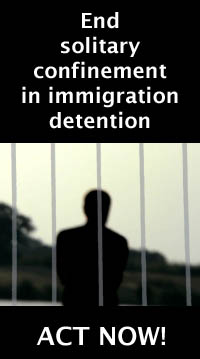The hole, AdSeg, protective custody, SMU, SHU—are all terms used to refer to solitary confinement, a form of incarceration where a prisoner is locked up for 23 hours a day with little or no human contact. Prisons often hide behind these rhetorical labels to avoid scrutiny under legal sanctions that prohibit indefinite placement in solitary confinement and require due process for those who are sentenced. Last week, the Massachusetts Supreme Court acknowledged this injustice and the need for change.
In its ruling, the court stated, “an inmate confined to administrative segregation…whether such confinement occurs in an area designated as an SMU, a [disciplinary segregation unit] or otherwise, is entitled, as a matter of due process, to notice of the basis on which he is so detained; a hearing at which he may contest the asserted rationale for his confinement; and a posthearing written notice explaining the reviewing authority's classification decision.”
In an investigative report issued earlier this year, NIJC and Physicians for Human Rights (PHR) found that solitary confinement in the immigration detention system is frequently used in a similarly arbitrary and unjust manner. Because the Department of Homeland Security (DHS) fails to provide oversight of the 250 prisons and county jails it contracts out, jails apply the same correctional policies for immigrants held for civil purposes as they do for people incarcerated on criminal convictions. Often, these policies deny meaningful opportunities for people to appeal their placement in solitary confinement.
NIJC and PHR researchers found that jails label solitary confinement as “protective custody” and use it to isolate “vulnerable” immigrants, including members of the LGBT community, victims of abuse, and the mentally ill. Despite its intent to protect, prolonged isolation can create dangerous results: severe paranoia and hallucinations, self-inflicted violence, and even suicide. Although DHS claims “protective custody” is not meant to be punitive, the conditions of confinement and its effects are nearly identical to the harmful, disciplinary conditions in solitary confinement. Jails repeatedly responded to NIJC’s inquiries regarding their solitary confinement policies by saying they did not put people in solitary confinement, making it apparent that they were simply mislabeling conditions that mirrored those of solitary confinement. AdSeg and protective custody were the most common labels used to describe conditions in which immigrants were held alone in single cells, denied human contact, and often cut off from phones and other services, sometimes including medical care.
The Massachusetts case dealt with many of these issues. The court found that plaintiff Edmund LaChance’s constitutional rights were violated when he was placed in administrative segregation for an indefinite period of time with only informal status reviews to challenge his placement. LaChance argued that, because he was held under even more restrictive conditions as prisoners officially classified as being held in solitary confinement—23 hour lockdown, foot and hand restraints while out of the cell, no-contact visits, and no access to special programming—he should have had the right to appeal his case in the same manner as those prisoners. The Massachusetts Supreme Court agreed, ruling that regardless of the label the jailers used, these punitive conditions amounted to solitary confinement, and that LaChance should have been allowed to appeal his arbitrary placement in administrative segregation. The court also declared that placing a prisoner in solitary confinement for over 90 days with no right to due process is illegal, and called for the Department of Corrections to issue time frames to regulate when prisoners are made aware of their sentencing, when hearings should take place, and when prisoners are to receive written notices of the reasons behind their sentencing decisions.
While the court’s ruling will only affect facilities in Massachusetts, it is an important sign that our society is recognizing—and taking action to end—the due process violations people suffer in solitary confinement. The federal government must also be held accountable for its unjust use of solitary confinement against immigrants. If you haven’t already, join more than 500 people who have signed NIJC's petition telling DHS to end solitary confinement in immigration detention.
Naiara Testai is a policy intern at Heartland Alliance’s National Immigrant Justice Center.

